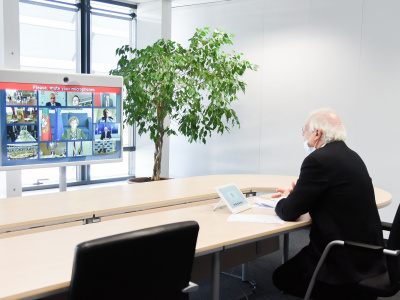ECDPM’s mandate focuses on Africa-Europe relations and the interface between the African and European continents. Our mission is to make policies work for sustainable and inclusive development. To accomplish that, we forge partnerships and inform and influence European, African and international policies.
This work plan outlines each of ECDPM’s five programmes and their planned activities for 2020-2021. This is the final year of the ECDPM 2017-2021 Strategy. That strategy explains the changing global context of our work and the rationale underlying the four key impact areas to which Centre activities contribute:
• Effective international cooperation frameworks and tools for tackling global challenges
• Legitimate and accountable public institutions and engaged societies
• Peaceful societies based on the rule of law, social cohesion and human dignity
• Sustainable economic transformation with shared prosperity and decent jobs
Our strategy implementation plan explains how ECDPM organises itself to deliver on its 2017-2021 strategy. Essential building blocks are the following:
• The ECDPM way of engagement. Our core roles, our focus on implementation, our way of thinking and working politically, our ability to bridge policy domains, and our experience in Africa-Europe relations. ECDPM is respected for its wide network of partners and privileged access to key stakeholders and policymakers in the foreign and development policy communities of Europe, Africa and beyond. Our partners come from ministries, institutions, international organisations, academia, social and economic agencies, and think tanks in Africa and Europe, like the members of the European Think Tanks Group.
• Our organisational structure. Five core programmes, alongside the Centre’s horizontal support functions. The programmes are European External Affairs; African Institutions and Reform Dynamics; Migration; Security and Resilience; and Economic and Agricultural Transformation. That last programme has three teams: (i) trade, investment and financing for sustainable development; (ii) food systems, agricultural transformation and food security; and (iii) private sector engagement.
• The ECDPM approach to strategic planning and learning, monitoring and evaluation. We apply a theory of change approach,formulating specific theories of change for each of our work streams. This allows us to plan our work and take advantage of opportunities in ways that are consistent with our strategy. Our theories of change are regularly reviewed, adapted and used as an input to our annual work plans.
The first year of the new European Commission and parliament will show us if the EU can be more “geopolitical” in today’s volatile, uncertain and complex world. It will also become clearer whether the EU can move beyond the issues that divide its member states, and appeal to younger generations that grew up with the benefits of EU membership, though without having witnessed the Union’s blood-drenched origins. In external policy, the challenge will be to develop the interest-based but value-driven agenda the EU announced some years ago.
The EU is now putting in place a number of key policies and instruments, such as the next long-term budget, the External Investment Plan and the proposed Neighbourhood, Development and International Cooperation Instrument (NDICI). ECDPM closely follows these. Other high priorities are migration, food security, conflict and resilience, and climate change. Already, the devastating effects of climate change are upon us. Scorching summers lead to overwhelming forest fires; and flash floods, droughts and lower water levels threaten millions, while undermining transport and energy. Ever scarcer resources can exacerbate existing conflicts and awaken slumbering security issues. Growing numbers of climate refugees will therefore likely continue to challenge the hospitality and solidarity mechanisms of host and transit countries, both in Africa and in Europe.
How will this affect the new partnership between Europe and Africa? Whatever the outcome of the post-Cotonou negotiations, Africa has clearly shown it wants to be part of elaborating a new relationship. In Africa, ECDPM will continue its work on the roll out of the African Union (AU) reforms and continental free trade area.







